Learn how VPNs protect IoT devices by enhancing privacy, encrypting data, and securing connections. Get your best VPN for IoT devices now. Free and reliable.
IoT, the Internet of Things, is a growing technology field that connects various smart devices together through the Internet. These devices include smart home devices, wearable devices, security cameras, smart appliances, etc., which communicate with each other through the network and perform various tasks. With the popularity of IoT, more and more daily affairs in life have become automated and intelligent, improving the convenience of people's lives.
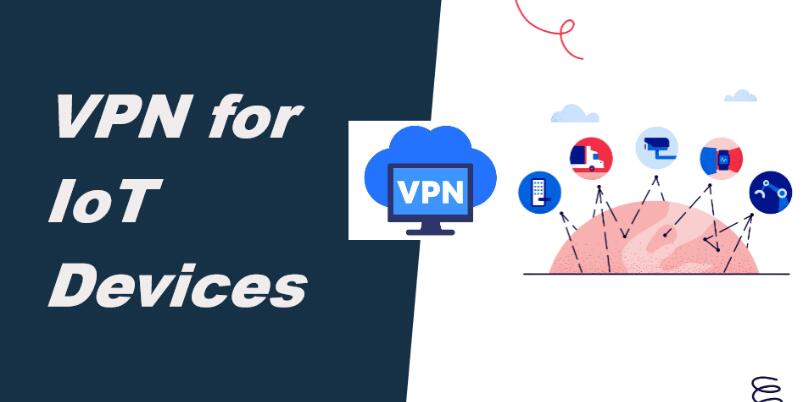
However, the popularity of these devices also brings new security challenges because they usually lack strong built-in security protection measures. To ensure the security of these IoT devices, it becomes crucial to use VPN for IoT. Why use VPN, what specific benefits can VPN bring to IoT users, and how to choose the best VPN for IoT? Please see below.
IoT devices usually have IP addresses. IoT devices communicate over the Internet, and IP addresses are unique identifiers for devices in the network. IP addresses allow devices to identify each other, exchange data, and connect with other devices on the Internet or local area network.
However, the types of IP addresses used by IoT devices can vary, and usually include the following types:
1. Private IP addresses: Many IoT devices are connected to the local network (LAN) of a home or business, in which case they usually use private IP addresses assigned by a router.
2. Public IP addresses: Some IoT devices may be directly connected to the Internet, in which case they use public IP addresses. This means that the device can be accessed by the outside world, especially when the device is designed for remote control or monitoring.
3. IPv4 and IPv6: Due to the huge number of IoT devices, traditional IPv4 addresses may not be sufficient, and more and more IoT devices are beginning to adopt IPv6 addresses, which provide a wider address space.

You see, IP addresses are essential for network communication of IoT devices, but they can also become potential security risks. Therefore, it becomes very important to use security measures such as VPN to hide and protect these IP addresses and guarantee IoT device security.
The security of IoT devices is usually relatively weak and vulnerable to various cyber attacks. This is because many IoT devices are designed with functionality and cost-effectiveness in mind, often ignoring security.
Such devices lack strong passwords and authentication; firmware and software updates are not timely; they are interconnected to form a wide network that is vulnerable to collective threats; data transmitted over the network is usually not encrypted, or the encryption measures are not strong enough, making the data in transit easy to be intercepted, tampered with, or stolen.
Users should take necessary security measures, such as regularly updating firmware, using strong passwords, and choosing a secure VPN with strong data encryption to protect network connections.
So, let's look at this question again, should IoT devices use VPN? The answer is yes. Using VPN for IoT devices can provide many conveniences for the use of IoT devices, such as:
1. Data encryption and privacy protection
2. Hiding the real IP address
3. Preventing intrusion and attack
4. Cross-border access and geographical restrictions
Some IoT devices may rely on servers or services in a specific region. VPN can help bypass geographical restrictions and ensure that the device can be used normally anywhere.
5. Unified protection of multiple devices
By configuring VPN on the router or LAN, users can protect all IoT devices in the entire home or office network without setting up VPN for each device separately.
With its powerful encryption and easy-to-use interface, iTop VPN is particularly suitable for users who want to create a secure network for IoT devices. Its double VPN feature provides multi-layer security protection, ensuring that all communications of smart home devices are encrypted and protected. Give users a flexible option for selecting a free VPN version and a price-friendly pro version.
The industry's top AES-256 encryption method and multiple VPN protocols can effectively encrypt all traffic and data passing through your IoT devices, making it impossible for third parties to track them. In addition, this speed VPN for PC and mobile focuses on providing a smooth user experience and supports multiple device platforms, making it a reliable protector of IoT devices.
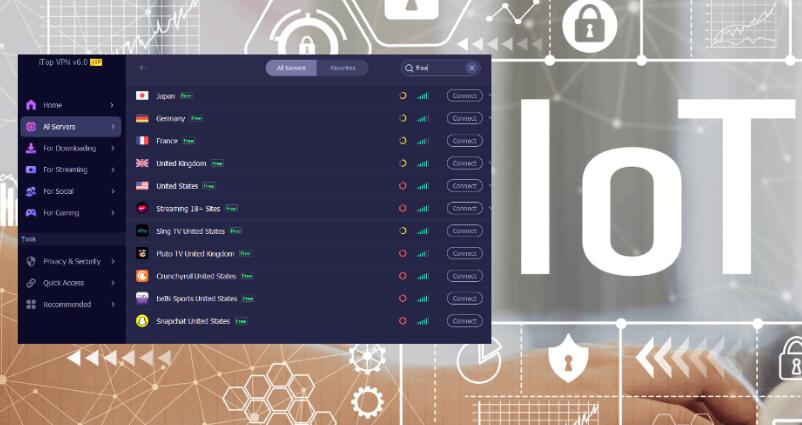
Key features:
- Double VPN encryption: Multi-layer encryption technology ensures data security, especially suitable for IoT devices that require high privacy and protection.
- Global server network: With more than 3,200 VPN servers in more than 100 countries, it ensures stable connections worldwide, suitable for IoT smart device control anytime, anywhere.
- Advanced LAN support: iTop VPN can cover the entire IoT network by setting up a LAN, so that all connected smart devices can get VPN security protection without affecting performance.
- Traffic optimization: Designed to reduce latency and ensure a stable connection, it is especially suitable for devices that rely on constant connection, such as video surveillance and smart lighting.
- Kill Switch: Even if the VPN connection is unstable, its kill switch feature will prevent any data leakage and protect your device from data exposure risks.
NordVPN is known for its military-grade encryption and massive VPN servers, which make it an ideal choice for those running a large number of IoT devices at home or in the enterprise. NordVPN not only provides seamless device compatibility, but also has high-protection features that can resist cyber attacks, block malware, and prevent any unauthorized access.
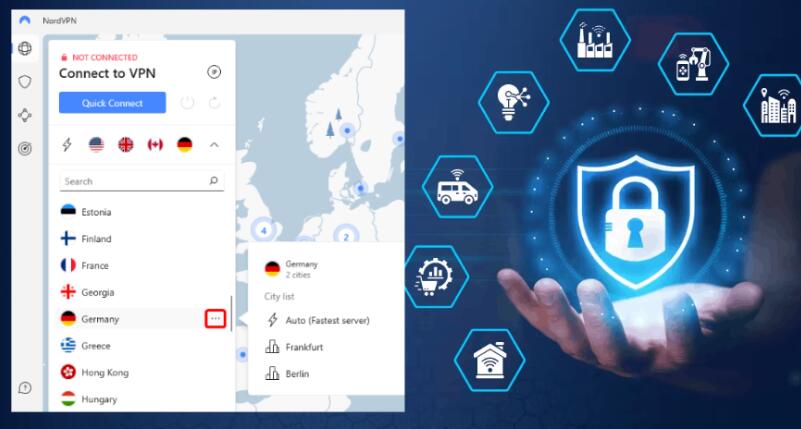
Key features:
- Double encryption technology: Like iTop VPN, the double VPN feature encrypts data twice to ensure that communication between devices is impeccable, which is particularly suitable for the Industrial Internet of Things (IIoT) that handles sensitive data.
- CyberSec security suite: Automatically detects and blocks malicious websites and ads, prevents IoT devices from being infected with malware, and provides an additional layer of security.
- Router compatibility: NordVPN can be easily integrated into home and enterprise routers, providing one-click security protection for the entire IoT network.
- Kill switch function is also provided to prevent network disconnection and continue data protection.
ExpressVPN is highly favored for its excellent speed and top-level encryption, especially for IoT devices that require fast response, such as smart door locks, video surveillance, and smart speakers. It ensures device privacy and data security without affecting the performance and efficiency of IoT devices.
In addition, ExpressVPN's global server network ensures stable connections in various environments. However, it requires a subscription, and the price is the highest in the industry. If you have a limited budget, you can consider the ExpressVPN alternatives such as iTop VPN and NordVPN.
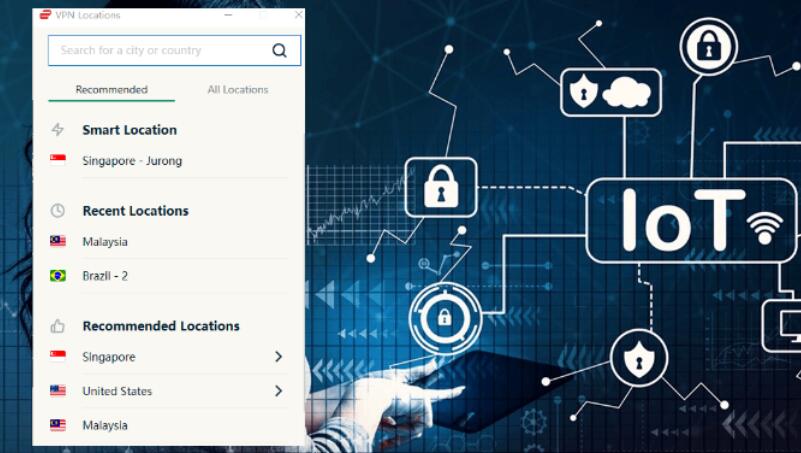
Key features:
- AES-256 encryption standard: The industry's strongest encryption technology ensures that the data of smart home devices is fully protected in any network environment.
- Speed optimization: Even for remotely controlled devices, ExpressVPN's high-speed servers can ensure low-latency connections, especially for IoT devices that require high real-time response.
- Wide compatibility: Supports multiple platforms and router installations, allowing users to protect multiple IoT devices while keeping them running efficiently, ensuring seamless connection of home and office automation systems.
By using a VPN for IoT, you can create a secure network environment for IoT devices, ensuring the security of data transmission and device communication. This section takes the free VPN version of iTop VPN as an example to show you a simple setup process. You can follow the steps below for a free trial.
Step 1. Download and install the iTop VPN app for your device.
Step 2. Log in to iTop VPN and select a suitable server location to ensure the best connection and low latency for IoT devices. Click the Connect button.
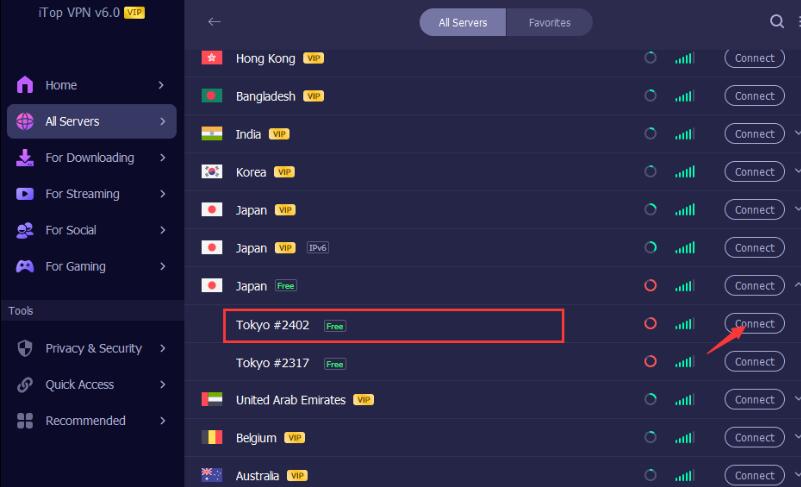
Step 3. After the connection is successful, check whether the current IP has been switched to ensure that the real IP of your IoT device will be hidden
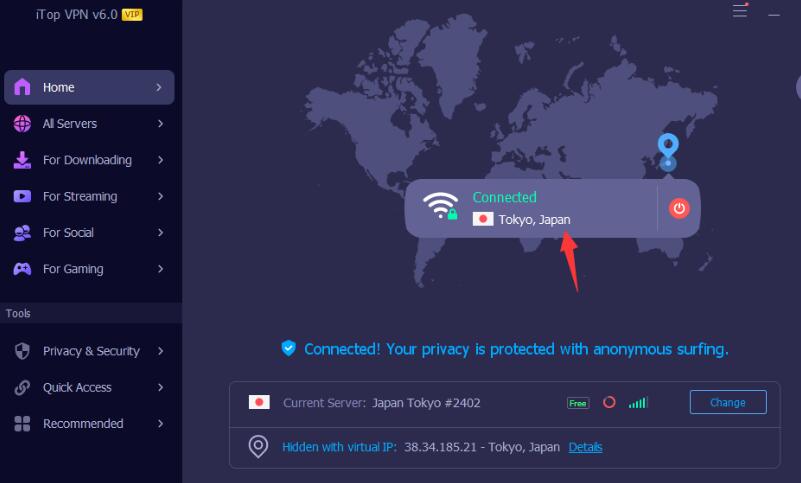
Step 4. Enable iTop VPN's LAN tool and apply iTop VPN in your LAN so that all connected IoT devices are automatically protected by encryption.
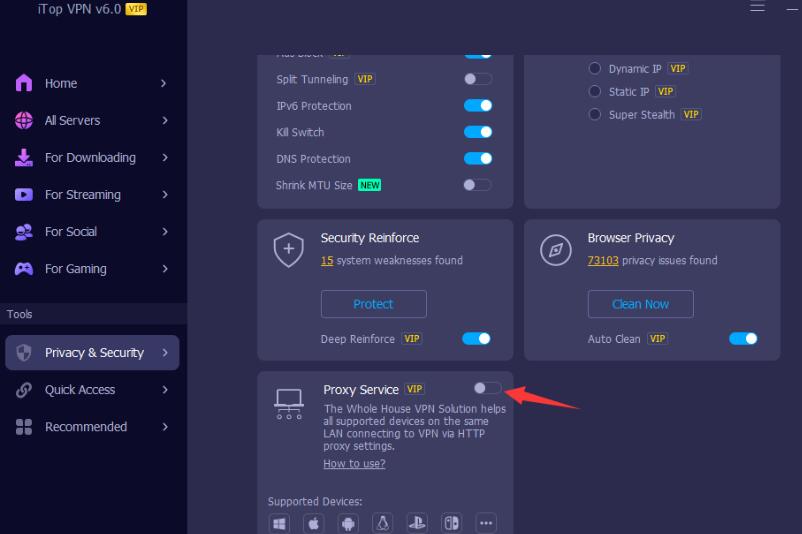
The Bottom Line
By using a VPN for IoT, all your IoT devices can run in a safer and more private network environment, effectively preventing data leakage and network attacks. Whether you connect directly through the client, configure your router, or use the LAN function of iTop VPN, your IoT devices can enjoy the strong encryption protection and global server support provided by VPN. What are you waiting for? Choose the VPN that best matches your current needs and start fully protecting all your IoT devices.
10+ dedicated social app servers
Unblock your favorite apps
Encrypt and protect data
